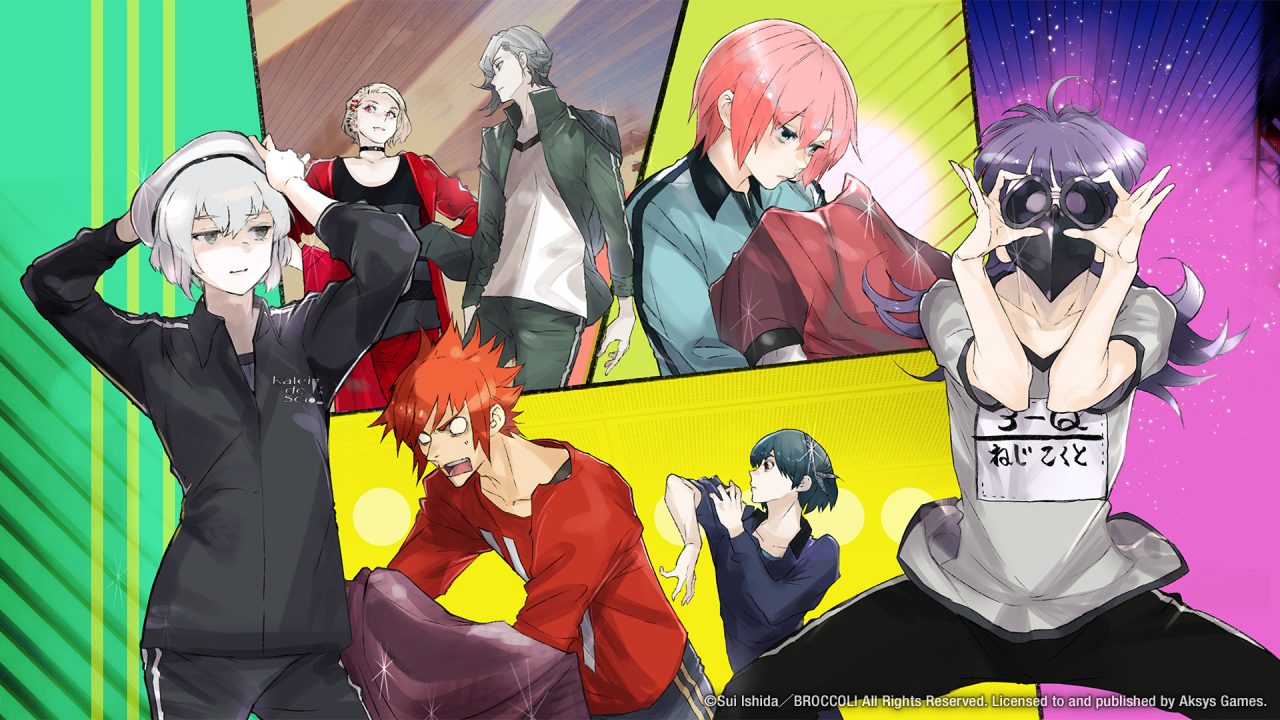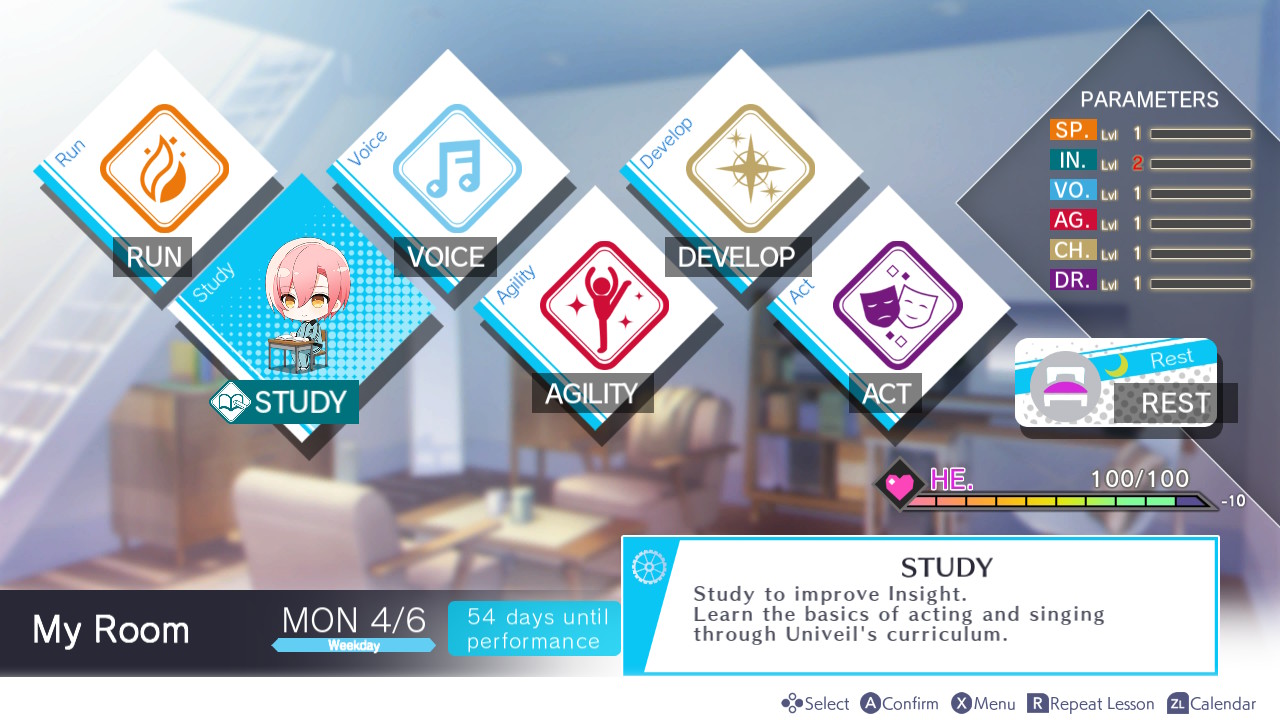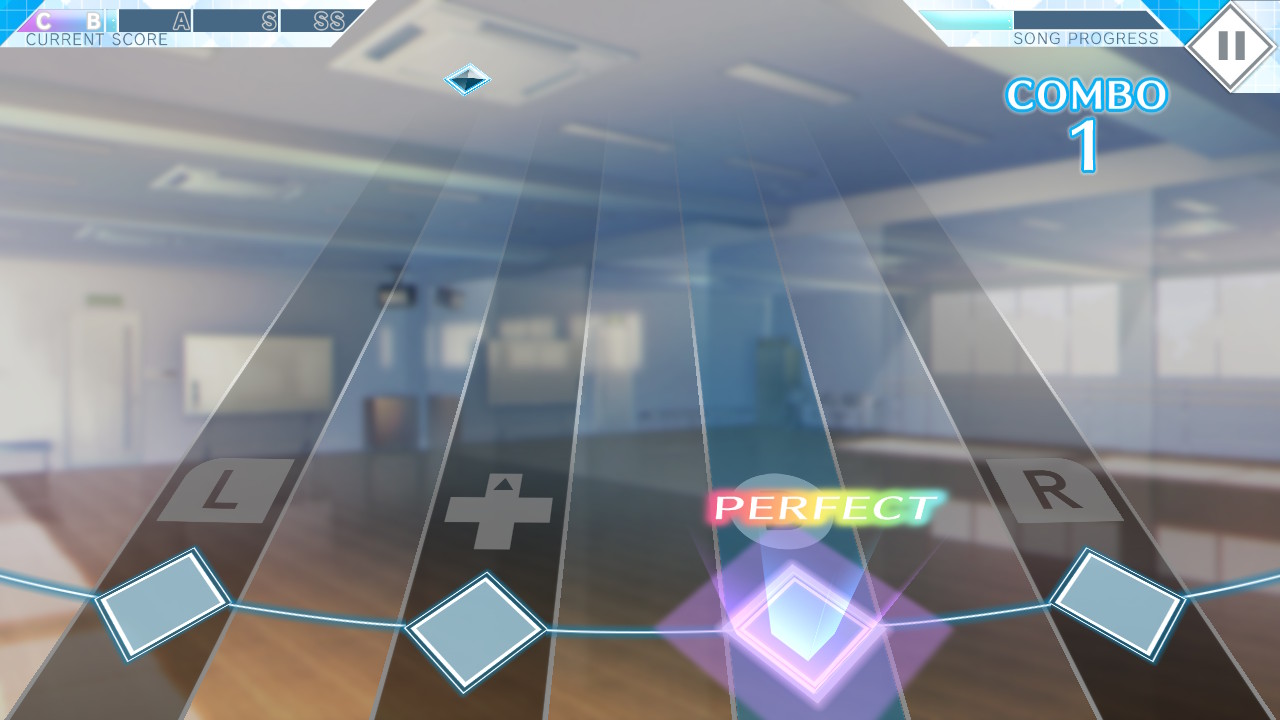Creative leaps are things to appreciate, even if they ultimately fumble. Otome visual novel Jack Jeanne takes a mighty leap regarding its story and rhythm action gameplay elements, but does it manage to stick the landing? The answer is a resounding yes, as a great visual novel experience lies at the game’s core, although otome fans looking for more in-your-face romance might be left wanting.
Jack Jeanne’s story begins with main character Kisa Tachibana going about her life. Her older brother Tsuki was a renowned prodigy at Univeil, a prestigious performing arts school, before disappearing after graduation. Despite finding inspiration in Tsuki’s performances, Kisa resigns to being unable to follow in his footsteps. For starters, she lacks money. Plus, there’s the even more significant hurdle of Univeil only accepting male students. So Kisa plans on working immediately and not attending high school to help support her family. However, a chance encounter with Univeil’s principal leads to a potential enrollment opportunity, but only under two conditions should she pass the auditions. One, she must keep her gender a secret. Two, she must get a leading role in the school’s final performance at the end of the year.
Kisa accepts these terms, placing in Quartz, one of the four classes that make up Univeil. As she interacts with her other Quartz classmates, she encounters colorful teachers, community members, and the students of the other classes: the singing specialist Rhodonite, the physically active Onyx, and the performing genius Amber. Can Kisa adhere to the strict guidelines required of her to remain at Univeil to achieve her dream of standing on the stage? Jack Jeanne explores what occurs during Kisa’s first school year as she takes those tentative first steps.

Jack Jeanne has a structure similar to any other traditional VN. Players take on Kisa’s role in a given story scene, moving the text forward until reaching a decision point that helps move the plot forward. In addition, however, this VN has further layers of gameplay interactivity. These gaming elements might initially throw VN fans in particular for a loop, but they certainly allow the title to appeal to a broader gaming audience.
Jack Jeanne is divided into daily segments as Kisa and the rest of Quartz prepare for whichever performance is upcoming; there are five different performances in-game. Kisa attends classes on school days with the option to go out and mingle with other characters on the weekend. The weekend segments utilize a map, allowing you to see which characters and unlockable events are currently available. During the school week, Kisa decides on which element of theater she wants to study that day, such as singing lessons to improve her voice or dancing to improve agility. She gathers points towards raising that statistic’s level if she’s successful in that lesson. A health meter also plays into the lessons, depleting with every lesson taken. Lower health increases the likelihood of failing a lesson, so it’s vital to rest occasionally to replenish it. Each potential Quartz love interest has an associated status parameter. For example, Shirota specializes in singing and is connected to voice, while newcomer Suzu is in touch with the fundamentals needed for class and is associated with overall spirit. Raising levels for a love interest’s target parameter, alongside increasing their affection through story responses and visiting with them, is paramount to unlocking their character-specific routes.

While the gameplay mechanics I described are in line with RPGs, one cannot ignore the rhythm action component of Jack Jeanne. There are two types of rhythm games here, singing and dancing. The singing rhythm segment has you choosing one of two buttons based on onscreen directional cues. Dancing numbers are more intuitive, relying on four differing buttons for players to complete. These mandatory rhythm sequences help break up rather lengthy story scenes. As an accessibility feature, you can either increase or decrease the rhythm games’ difficulty depending on your comfort level with the mechanics. Some dancing numbers are challenging even on normal difficulty, but that’s because there’s a points system that requires a high score to see the game’s best scenes. In contrast, the song numbers seemed relatively more forgiving regarding points collection. Once you play through an entire performance, you can revisit its rhythm games at any time via the gallery menu.
It took some time for me to warm up to Jack Jeanne, primarily because I’m not a huge fan of rhythm games. However, once I was comfortable with the controls, I found those segments to be solid additions to the game, especially for those wanting more interactivity than what’s generally found in VNs. Still, what draws any VN fan to a game is its narrative and characters. In this regard, Jack Jeanne does a phenomenal job. The story is easily its most significant selling point! Kisa’s journey to prove herself onstage and her quest for identity gets handled brilliantly. I cared not just about the quirky characters of Quartz but also about several of the colorfully vibrant cast members. The creative plot thoughtfully tackles identity and gender issues. Strangely for an otome, the romance is quieter and less of an obvious focal point if you even initiate one. Having Kisa choose to focus on her goal of becoming a lead performer alone can lead to a relatively satisfactory conclusion. However, I found the romance routes also to be touching. Utilizing a “stories within the story” format for the various in-game performances is also cleverly handled in the narrative. The boisterous Kokuto and the distant-at-first Shirota are roster standouts, but I love almost all the game’s characters.

Sui Ishida, best known for his manga series Tokyo Ghoul, is responsible for Jack Jeanne’s character designs and overall story. I love how distinct his character designs are and how visually stunning the artwork and CG scenes are. The script is lengthy, with several permutations depending on which character route you prefer. However, I was floored by how heartfelt and emotional the narrative could be. The English localization by Aksys Games is impressive. I also credit the game for its stellar voice work overall, as the cast has to act in their given roles and put on dramatic performances as other characters, sometimes drastically switching things like age and gender. Kisa’s voice actor, in particular, does a fantastic job showcasing her range as she takes on both male and female roles, even becoming a villainous character at one point. The music playing in the background and throughout the in-game performances was quite lovely to listen to and the best feature of Jack Jeanne besides the plot.
If I had one graphics complaint, it would be that the 3D graphics used for the dance performances are not as compelling as the visual novel illustrations. Also, in an attempt to make the rhythm action sequences visually appealing, the backgrounds during the stage performances are somewhat distracting. Beyond that, though, there isn’t much I can fault Jack Jeanne with. The game’s sheer length makes its replayability aspect seem daunting, especially since there is no story map. Still, you get satisfactory endings on any route you pursue should you get high scores in classes and performances.

As previously mentioned, the gallery menu allows you to play through the rhythm action sequences again. It also helpfully lets you view any event CGs you’ve unlocked, see movies from the performances you’ve unlocked, listen to BGMs, read the performances’ stage scripts, view trophies, and glimpse character-specific scenario scenes again under history. Even though there is no story map, you can auto-skip through text you’ve already seen. In that regard, there’s a wealth of content in the main game proper and outside!
Jack Jeanne is an interesting otome title focusing more on its plot and emotional buildup than on direct romance. However, it still manages to spin a compelling and thought-provoking narrative with a whole lot of heart. Jack Jeanne celebrates creativity with characters you can truly appreciate when the final curtain falls. It’s a prime example of a game taking an innovative risk by leaping into the unknown and becoming a much stronger gaming experience.



